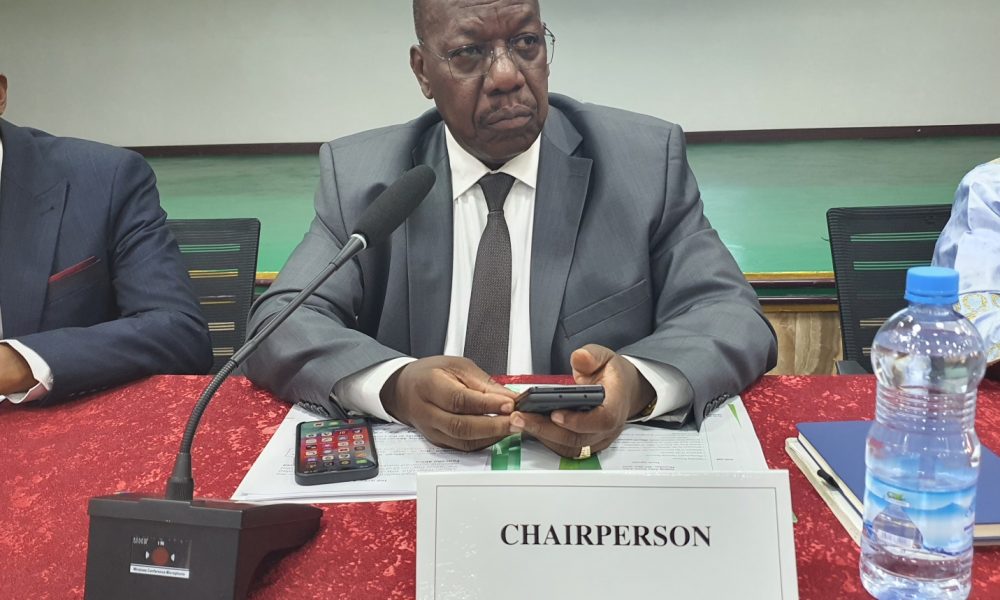By Ephraim Modi Duku Sokiri
Peace monitoring body, the Reconstituted Joint Monitoring and Evaluation Commission (RJMEC), is urging the parties to the 2018 Revitalized Peace Agreement to expedite the implementation of the roadmap to prepare the country for a transition to democracy.
R-JMEC’s Chairperson, Amb. Charles Tai Gituai, reminded the parties to the Revitalized Transitional Government of National Unity (R-TGoNU) to focus on executing the vital stage of the roadmap.
“It is paramount that our collective attention remains on the very pressing issues regarding the implementation of the Revitalized Agreement on the Resolution of the Conflict in the Republic of South Sudan (R-ARCISS),” he said.
However, Gituai lauded R-TGoNU for the recent presentation of the justice mechanism in the National Parliament as per the implementation of the roadmap.
“It is encouraging that the R-TGoNU has continued to reassure South Sudanese that it remains focused and will deliver on its commitments to implement the R-ARCSS, including holding elections as scheduled,” he said.
“While this is welcome, it is important that milestones are reached as per the roadmap.”
The R-JMEC boss revealed they have registered some key commitments with some forms of government, including meeting the Transitional National Legislative Assembly (TNLA) in regard to the progress made in the implementation of the peace agreement.
During his moment at the National Parliament, he sketched acute areas of alarm for the lawmakers to focus on together with the executive body in strengthening the capacity of the roadmap.
“I pointed out the critical role of the TNLA in enacting laws to support the implementation of the peace agreement and encouraged them to coordinate their efforts with the executive to deliver on the promises of the agreement,” he added.
It is also paramount that the Inter-Governmental Authority on Development (IGAD), as a negotiator, and other East African heads of state, as peace guarantors, note recent steps in roadmap implementation.
“I also engaged a number of R-TGoNU ministers and other peace stakeholders and briefed H.E. William Samoei Ruto, President of the Republic of Kenya, on the status of the implementation of the Revitalized Peace Agreement,” said Amb. Gituai.
Article 2.3.2 of the roadmap, noted that a fair and efficient criminal justice system is a prerequisite for any society based on the rule of law.
“It is encouraging that there are ongoing law enforcement reform initiatives led by the South Sudan National Police Service (SSNPS) and the Ministry of Justice and Constitutional Affairs in collaboration with the University of Juba,” said Amb. Gituai.
As the Transitional Period recommends, the R-TGoNU is required to reconstitute the Judicial Service Commission, which will spearhead judicial reforms and the restructuring of the judiciary.
Amb. Gituai also informed me that the R-TGoNU has inaugurated the Public Procurement and Disposal of Assets Board, which will serve to advance the management of the R-TGoNU’s finances and increase the competitiveness of the private sector in the public procurement process in accordance with the principles of good governance.
It also requires the R-TGoNU to establish an independent, impartial, and credible constitutional court, regulated by law. The judicial reforms are to be consistent with recommendations from the Judicial Reform Commission (JRC) to the R-TGoNU.
Reflecting that elections are due to take place in December 2024, RJMEC pointed out that the operationalization of the Political Parties Act is behind schedule, despite having been enacted over ten months ago.
In addition, the Political Parties Council has not yet been reconstituted as a critical body for political parties to register in order to participate in the elections, to entrench electoral democratic processes in the country, and to improve the overall political and civic space for public participation in the elections.
Article 1.19 of the Agreement, in accordance with the roadmap, requires the process of restructuring and reconstituting the various commissions and institutions at the national level.
The national institutions play a critical role in improving accountability, transparency, institutional independence, and efficiency in national governance.
Article 4.8.1.14.1 of the Agreement into the Roadmap necessitates publication of the proceeds of oil sales by R-TGoNU, and the Ministry of Petroleum continues to issue the daily petroleum marketing report on oil lofting and sales.
Meanwhile, progress has been enormously slow in implementing the 2018 Revitalized Peace Agreement, a hybrid court, the Commission for Truth, Reconciliation, and Healing (CTRH), and a reparation process that should have been established more than two years ago.
Some key aspects of the peace agreement, including the deployment of phase I and the unification of phase II of the security forces, have been plagued by the allocation of ratios of representation and resources.
All parties to the agreement have failed to meet deadlines set for critical reforms and the establishment of the Transitional Justice Mechanism without credible justification for the delays.




